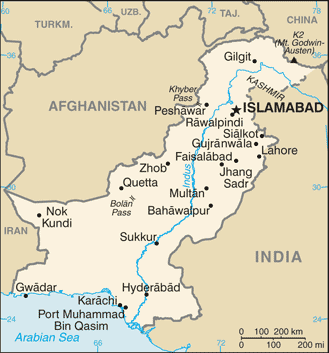Pakistan

Latest from USIP on Pakistan
- October 5, 2012 | In the Field
USIP sponsored a peacebuilding and conflict management workshop from September 20 through October 1in Turkey. Eleven leaders represented all of the major Sufi orders and came from both rural and urban centers. In addition to an intensive workshop, the program intended for the Pakistanis to learn from Turkish civil society organizations and to better understand their model of religious moderation.
- September 6, 2012 | Publication
Jim Marshall, USIP President-select, meets with peacebuilders and USIP partners working to promote peace, tolerance, and social cohesion in Pakistan.
- September 3, 2012 | Publication
Read about USIP’s on-the-ground and region-specific work aimed at the prevention of conflict in North Africa, the Middle East, South and Northeast Asia, and our special project on atrocity prevention.
- August 22, 2012 | Publication
More than nine hundred women were “killed in the name of honor” in Pakistan in 2011, according to a new report by the Human Rights Commission of Pakistan. In some situations, trained facilitators with the right skills can resolve the disputes and misunderstandings that might otherwise fuel “honor” killings.
Overview
The year 2011 saw progressive deterioration in the U.S.–Pakistan relationship, beginning with the killing of two Pakistani citizens by U.S. contractor Raymond Davis, and ending with a NATO airstrike on a Pakistan border outpost that killed twenty-four Pakistani soldiers, with multiple crises in between. In response, Pakistan shut down NATO supply routes, demanded that the U.S. vacate the Shamsi airbase in Pakistan, boycotted the December 5 international Bonn conference on Afghanistan, and initiated a parliamentary committee review to “reset” the U.S.–Pakistan relationship. As anti–U.S. sentiment grew in Pakistan, anti-Pakistan sentiments continued among U.S. policymakers increasingly frustrated by the perceived failure of Pakistani authorities to crackdown on militant safe havens in Pakistan.
Despite these problems, both sides still indicate a desire to mend ties and continue working together, even if under new terms. Pakistan’s importance in an Afghan peace settlement and for long-term stability in the region is well understood, as is the need for Pakistan to not become internationally isolated due to a rupture in its relations with Washington. The recent acrimony and the negative popular perceptions of the “other” in both countries, however, will not make it easy for the two to work through their difficulties.
In contrast to the deteriorating U.S.-Pakistan relationship, there has been a marked improvement during the past year in Indo-Pak relations, although this progress remains fragile and could easily be derailed by another terrorist incident similar to the 2008 Mumbai attacks linked to Pakistan-based militant groups. Domestically, while the number of terrorist attacks has declined over the past few months, Pakistan still remains home to a number of Islamist militant outfits that continue to threaten the state and citizens alike.
Against this background, USIP’s Pakistan program remains focused on supporting policy-relevant analytical work that contributes to greater understanding of conflict and peace dynamics in Pakistan. The Institute’s programmatic work helps support initiatives that promote tolerance and prevent and mitigate violent extremism and conflict.
Going Forward: USIP Goals in Pakistan
USIP staff is working diligently towards conflict analysis and prevention and peace building in Pakistan through its various programs and projects.
- Improving Mutual Understanding between the U.S. and Pakistan
- Strengthening Capacity to Mitigate Conflict
- Promoting Peacebuilding through Education and Civil Society Initiatives
On the Ground
In an effort to improve mutual understanding between the U.S. and Pakistan, USIP holds events, conferences, and roundtables in Islamabad, Lahore, and Karachi on a variety of political and economic issues affecting the relationship between the two countries today.
- Watch the March 11, 2011 event in Islamabad, Pakistan on "Reflecting on Thimpu: the Future of the India-Pakistan Relationship."
- Watch the December 23, 2010 event in Islamabad, Pakistan on the "Relationship Between Food Insecurity, Poverty, Militancy and Conflict."
- Watch the December 20, 2010 event in Islamabad, Pakistan on "Afghanistan Endgame."
- Watch the August 6, 2010 event in Karachi, Pakistan on "Business and Investment Opportunities between Pakistan and the United States."
- Watch or listen to the May 31, 2010 event in Lahore, Pakistan on "Pakistan-U.S. Relations: The India Factor."
- Watch or listen to the April 22, 2010 event in Lahore, Pakistan on "Evolving Afghanistan: Implications for U.S. Relations."
- Watch a video of the April 7, 2010 event in Islamabad, Pakistan on the "Pak-U.S. Strategic Dialogue: Implications for the Bilateral Relationship."
Get Involved with USIP
- See upcoming public events at USIP
- Visit the USIP Newsroom
- Receive latest USIP news and analysis in your email
- Take a class at the Academy

